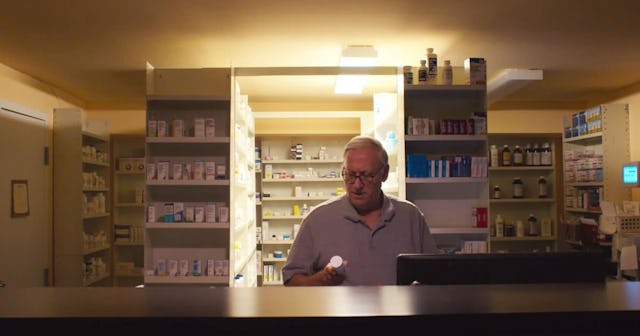Why 'The Pharmacist' Is The Most Important Show Streaming Right Now

I was almost 30 years old before I even heard the term “opioid epidemic,” so to say that I felt in the dark as a child is an understatement. My father became addicted to painkillers in the fall of ’88 after his first stomach surgery. I can’t speak for everyone who was raised by an addicted parent, but for me, personally, I’d never felt so lost in my whole life. And more importantly, I’d never really felt so alone. I didn’t understand why my father was acting the way he did.
Netflix/Youtube
But I think this was one of the more difficult, and less discussed elements of the opioid epidemic. My father got his prescription pills from a doctor. He wasn’t going to some dark corner of a big city to buy drugs illegally from a dealer. At first, everything about his actions seemed about as normal as coming down with strep throat. For the longest time, we just thought he was sick. Each year he had a different name for his ailment, and each time he visited a doctor, they took him seriously, and he left with more pills. And slowly, he got thinner, and his teeth fell out, and less and less of his old personality shined through, until he died from his addictions 10 years after they started, in a rundown one-bedroom apartment in rural Utah.
It wasn’t until years after his death that I started to learn that he’d fallen into something larger than himself, and that doctors, pharmacists, and drug companies had used their positions to allow my father to become a drug addict.
Netflix
And that right there is exactly why “The Pharmacist” on Netflix is so important. It is shining light on a system that turned mothers, fathers, sons, daughters, aunts, and uncles into drug addicts in the name of making a profit. It follows the actions of Dan Schneider in the late ’90s and early 2000’s as he catches his son’s killer after a bad drug deal. His son’s death propels him to start looking at the oxytocin prescriptions coming from his own pharmacy differently, and wonder if he was becoming a killer himself.
My father died in December of 2001, so for someone who lived it, I couldn’t help but feel old memories stirred up as I watched this four-episode true crime docuseries discuss things I was too young to understand, but found so very recognizable. As far as I know, my father never went to a pain clinic like the one run by Dr. Cleggett in Dan Schneider’s small town outside New Orleans. But I can remember going from one doctor to another with my father, him complaining of pain, and leaving with multiple prescriptions — and then going to multiple pharmacies to get them filled. My brother and I used to joke, calling his doctors his “drug dealers,” and apparently this wasn’t unusual behavior for pillheads in the late-’90s.
The part that really gave me pause while watching “The Pharmacist” was how many people, from drug reps to doctors to other pharmacists, were complacent in years of over-prescribing addictive opioids. Former Purdue Pharma sales representative Chris Davis mentions in the fourth episode of the docuseries that he wasn’t dumb, and that the people above him weren’t dumb, and the doctors and pharmacists he was meeting with clearly weren’t dumb. They all knew what was going on, and yet they are choose to play dumb.
Netflix/Youtube
None of the people pushing these drugs were oblivious, but they chose to continue because of simple greed. Between 1995 and 2001, the time frame of “The Pharmacist,” OxyContin brought in $2.8 billion in revenue for Purdue Pharma. That is a bonkers amount of money, and obviously it was enough for many, many, people to turn a blind eye as they prescribed to addicts like my father. The fact that so few stood up to say “no” is what makes Dan Schneider’s story so exceptional, and important to those of us who are still living in the rubble of this epidemic.
I remember once going with my father to visit a doctor. I was probably 15. I sat in the waiting room doing homework when the doctor came out, mentioned my father’s name to the receptionist, and more or less told her to blacklist him from getting appointments because he was an addict. She then asked if she should call the police, and the doctor said, “Not yet, but be ready.” I must have visited close to a hundred different doctors with my father, and this was the only time I saw a doctor, or anyone in the medical industry, tell my father, “No” and admit that he had a problem. But rather than offer him drug treatment, the doctor suggested calling the police. This is particularly troubling when I think back on the off-and-on stints my father spent in jail for drug-related crimes, but never once was he placed in a rehab program.
Netflix/Youtube
It’s hard to watch “The Pharmacist” and not wonder if there had been a Dan Schneider in rural Utah back in the late-’90s, whether my children might have a grandfather today. And this right here is why I feel “The Pharmacist” the most important show streaming right now. It’s shining light on a real problem that many people have dealt with, and will continue to deal with. It takes a comprehensive look at a systemic problem in the medical industry, how it failed us, and how we as a society can stand up on an individual level and save lives. As the son of a former drug addict, I can say with confidence that this is huge.
This article was originally published on